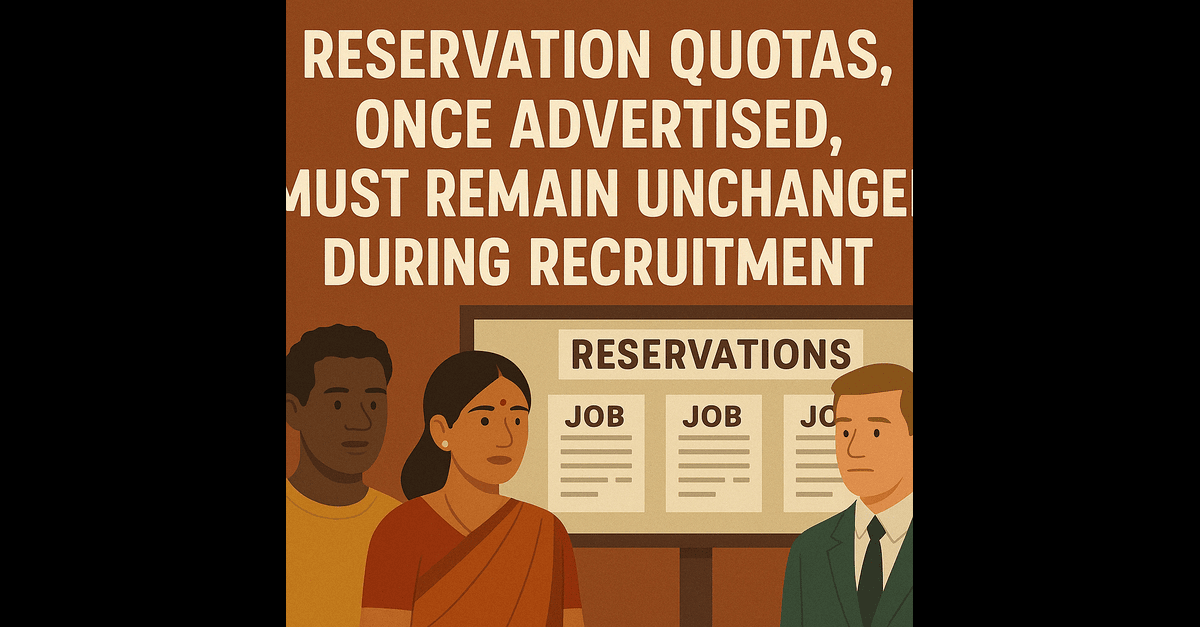INTRODUCTION
In a significant affirmation of the principles of transparency and fairness in public employment courts in India have consistently held that advertised reservation quotas are binding and cannot be altered. The principle in this ensures that candidates are being evaluated and the selection process is done based on the conditions which were originally notified in the recruitment advertisement, thereby upholding the integrity of the selection process. Any further post–hoc changes that were made to the reservation criteria, either by reducing or increasing the quota, can result in legal uncertainty, disadvantage to eligible candidates as well, and lead to potential violation of constitutional guarantees of equality and non-arbitrariness. This position reinforces administrative accountability and protects the rights of aspirants who plan and apply based on advertised terms.
BACKGROUND
The case arose out of the Punjab Public Service Commission recruitment process initiated through advertisement. It includes 26 posts of DSP. Two of these posts were reserved under the scheduled cast of sports categories. The appellant, Prabjot Kaur, and the private respondent had both applied under this category. The notification of the Punjab Civil Services Rules, 2020, mandates 33% horizontal reservation for women. The second sport, SC sport, was assigned to the Deputy Superintendent. After qualifying under this category, the appellant waited for the appointment. However, the private respondent who ranked first among male SC sports candidates challenged the reservation of the DSP post exclusively for women, arguing it was inconsistent with the roster issued by the state.
KEY POINTS
-
- Binding nature of advertised reservation: SC held that the reservation categories and the quotas mentioned in the advertised jobs are binding, and any subsequent alteration to these reservations is not permissible during the recruitment process.
- Legal Precedent: This judgement acts as a Precedent for the governmental and recruiting bodies that advertised jobs cannot be altered, as it is trusted by the public for the recruitment process.
- Fairness in recruitment: The court emphasizes the significance of upholding the fairness of the recruitment procedure. Changing the reservation criteria after the process has begun can result in unfairness towards candidates who applied based on the original criteria.
RECENT DEVELOPMENT
The learned judge of the Punjab and Haryana High Court rejected the writ petition from the private respondent, affirming the validity of the reservation under advertisement no 1 However, upon appeal, the division bench overturned this decision and sent the case back for further consideration, following a statement from the chief secretary of Punjab indicating that the reservation for SC sports was incorrect. The appellant contested this division bench ruling. The divisional bench’s view was rejected by the court. The court said that once the advertisement is published, the recruitment process cannot be changed and should be according to the provisions as laid down in it, and so neither the advertisement nor the recruitment process can be challenged. The court also noted that the private respondent participated in the earlier selection process without protest and raised objections only after the merit list was declared.
CONCLUSION
The court in this ruling held the importance of fairness, transparency, and adherence to the process in public recruitment. The principle of legal certainty and the expectation of the candidate were protected by the court. The judgment served as a crucial precedent reminding public authorities of any arbitrary changes in the recruitment process. The court says that such things would lead to arbitrariness in the selection process and undermine their trust in the system, which is violative of constitutional rights.
“PRIME LEGAL is a full-service law firm that has won a National Award and has more than 20 years of experience in an array of sectors and practice areas. Prime legal falls into the category of best law firm, best lawyer, best family lawyer, best divorce lawyer, best divorce law firm, best criminal lawyer, best criminal law firm, best consumer lawyer, best civil lawyer.”
WRITTEN BY PALAK CHAUHAN


